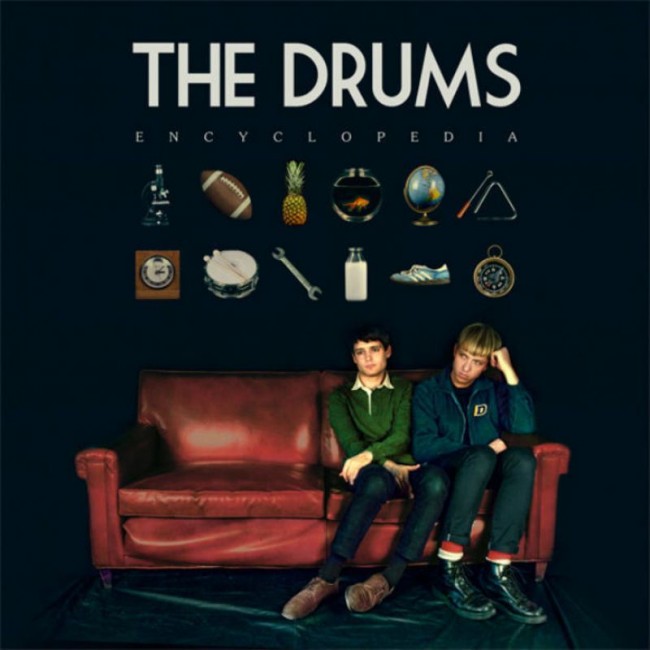The Drums return with their third album, three years after Portamento, and in their fifth year of life. Their second album was preceded by two years of intense recording, touring and promotional work, and their latest release, many events and changes affected the band, they are now a duo comprised of the original founders Jonny Pierce and Jacob Graham. Being left to their own devices, after experimenting with solo projects, some of which have not and some of which might see the light of day, the duo has become a far more bleaker yet sophisticated affair.
The Armageddon of “Magic Mountain” is the swirling introduction to Encyclopedia, a track that encapsulates The Drums’ more divergent approach to songwriting. The song is full to the brim with samples and vocalizations, while the band’s own trademark Surf-meets-Americana jangling seems to have taken Wavves’ heavier approach, paired with Sci-Fi lasers.
Pierce describes the album as being ‘the fruit of disappointment and disillusion, which blossomed in the realization that the two artists could finally create the music they really wanted to experiment with, now free, awaken and naked in front of their craft.’ Gone are the days of “Summertime”, now replaced by reflections on loss, nostalgia, redemption and vulnerability.
The communion of darker themes with a keener eye in experimentation is spread across the whole album, with each track demonstrating the chameleonic panache of Pierce and Graham. If the resigned “I Can’t Pretend” flirts with Baroque Pop made of Electronica and swelling strings that could make the amiable French dreamboats Phoenix squeal, “Bell Labs” twinkles with dark electronic musicality and an unsettling refrain that tints the semi-instrumental with disturbing undertones.
The Drums have pulled an MGMT here, whom are now detaching themselves from their Pop-friendly origins, and are now wading into an ocean of introspection and denser tones, amidst the repudiation of many fans. The past musical iterations of the band have not been however disavowed, and are instead tucked here and there in the now multi-layered and multi-chromatic compositions. Imbued with Phil Spector’s twee in the Americana-instilled symbolism of “US National Park”, heavily reliant on guitars, whistling and dramatic demise, the band has certainly not abandoned their dreamier and more naïve inflections.
“Kiss Me Again” is the only track that can fit the profile of The Drums of days of old, tambourines and all. With vocal utterings, Sci-Fi explosions, Surf Rock mannerism and a main character that is ever so feeble to affection, the track is a pitch-perfect single and a gem of a ditty.
Remnants of hummable hooks still emerge, but conceptually, the album is not meant to be made of self-contained three minute and a half experiences, it is instead a nervous, unrelenting voyage into what Piece describes as a “higher ground” filled with magic and redemption. The dualistic relation with religion seen in “Face of God” and “Let Me” rings autobiographical and intensely close to real life, whilst the recurrent symbol of the “mountain” as a utopian destination, a place in which you can be yourself, is the place where the band aspires to be.
Retrospectively, the band never was by definition a “happy” band. If it was not for the sound of their first EP, filled with jangly unrest, the content, at least lyrically, was sort of dark and misanthropic from the beginning. Whether through stark dark comedy or pompous supremacy, the Drums always sounded cool-headed, untouchable and stony-faced. So it does come as a surprise to see how they are instead vulnerable and affected by emotions.
Through “There Is Nothing Left” to “Deep In My Heart” the band falsely disguises itself as imperturbable, while in the shuffling space age ballad that is “Break My Heart” they finally open up as being heartbroken and unrestrainedly masochist through the pained vocals. Similarly in “I Hope Time Doesn’t Change Him” Pierce feels insecure and more fragile than ever, with a composition guised as a cross between the glimmering “Neon Lights”-era Kraftwerk and early-noughties whirring guitars.
Encyclopedia is an honest album, in which Pierce and Graham have taken their own opposite views and ideas and stuck to them, giving the listener an encyclopaedic view of their musical ability. The anger, confusion and loneliness, the adversity that should have stopped them, made them return stronger and protected by a grand, majestic and beautifully shimmering sound, a sound that could not be possibly envisioned at the time of their more crowd-pleasing material such as “Submarine”.
With the closing track “Wild Geese”, the journey to the “mountain” finally ends, as the album reaches its apex of maturity and development. Adorned with wintry synth and keyboard orchestrations and guitar flourishes, the track’s Arcadian motif is an example of beautiful Electronica. While there is apparent peacefulness brought by the image of flying wild geese, there is an unintelligible adversity going on in the vision. Flying through the thunder, away from the rain and wind, the wild geese might be seen as a metaphor of The Drums themselves, who against everything and all, are on their own personal journey to some enchanted highlands.
[Rating:4]
Released on the 22nd of September on Minor Records.




